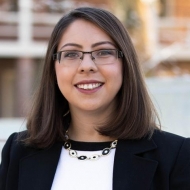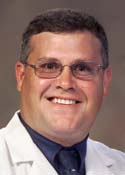With a grant from the U.S. Department of Justice, a team of experts from the University of Arizona, the Southern Arizona Center Against Sexual Assault and Banner University Medical Center – Tucson are expanding services for survivors of sexual assault with a new forensic exam site at Banner.
The $499,382 grant, awarded through the Office for Victims of Crime, has also allowed for the creation of a Sexual Assault Response Team that brings together experts from the university, hospital and community to guide the exam program and ensure it meets survivor needs.
Medical forensic exams are used by medical professionals to provide a specialized and compassionate medical exam for victims of sexual violence. Sexual assault kits can also be used to gather and preserve physical evidence following a reported sexual assault. The exams and kits use specialized equipment and are provided by sexual assault forensic examiners through the Southern Arizona Center Against Sexual Assault, or SACASA, in a private, survivor-centered space.
 Until now, SACASA is only able to provide medical forensic exams at Tucson Medical Center, which has long been an instrumental supporter of survivor care. UArizona researcher Elise Lopez, principal investigator on the Department of Justice grant, said the second exam site, which opened last week at Banner University Medical Center – Tucson, will expand access for people who might not otherwise obtain the service. That includes UArizona students, for most of whom Banner is closer than TMC.
Until now, SACASA is only able to provide medical forensic exams at Tucson Medical Center, which has long been an instrumental supporter of survivor care. UArizona researcher Elise Lopez, principal investigator on the Department of Justice grant, said the second exam site, which opened last week at Banner University Medical Center – Tucson, will expand access for people who might not otherwise obtain the service. That includes UArizona students, for most of whom Banner is closer than TMC.
"Sometimes, survivors go to their nearest hospital when they need medical follow-up after a sexual assault. They're triaged, medically stabilized and then may be told, 'We'll need to transfer you to TMC for the medical forensic exam,'" said Lopez, director of the University of Arizona Consortium on Gender Based Violence in the College of Social and Behavioral Sciences.
"For a person who has been traumatized – who's tired, who's already gotten some medical care – it's an extra step to go elsewhere for the forensic exam. They're exhausted and likely still in the clothing they were wearing when they were assaulted. Having to go to another location for a forensic exam is a huge barrier when someone is in this state," Lopez said. "Many of our students are young and may not have experience directing themselves through medical processes, and may not have transportation. Having this service so close to them is going to be a huge asset for those who want it."
The University of Arizona is one of eight universities to be awarded a Department of Justice grant to support the establishment or expansion of sexual assault nurse examiner programs that offer medical forensic care, advocacy and other victim services to sexual assault survivors on college campuses. Nearly $4 million in total grants were awarded.
While the grant is focused on serving the higher education community, medical forensic exams at Banner will be available to anyone who needs them, Lopez said.
 The idea to open a second medical forensic exam site at Banner was conceived years ago by Dr. Dale Woolridge, a UArizona professor of emergency medicine and emergency medicine physician at Banner. The idea has been widely supported by local Sexual Assault Response Team partners such as SACASA, the Tucson Police Department, the Pima County Attorney's Office and other victims' services providers interested in providing more access for survivors.
The idea to open a second medical forensic exam site at Banner was conceived years ago by Dr. Dale Woolridge, a UArizona professor of emergency medicine and emergency medicine physician at Banner. The idea has been widely supported by local Sexual Assault Response Team partners such as SACASA, the Tucson Police Department, the Pima County Attorney's Office and other victims' services providers interested in providing more access for survivors.
Woolridge and Lopez joined with other representatives from Banner, SACASA, the UArizona Survivor Advocacy Program and the University of Arizona Police Department to lay the groundwork for the program.
"The expansion of services has largely become possible due to the added commitments from our partners. Both Banner and SACASA have embraced this commitment for services and also have committed infrastructure and personnel support," Woolridge said. "We will now be able to offer broader services in the same compassionate manner at a second location and thus avoid what used to be a necessary transfer of care."
Until now, Lopez said, federal funding limited this specialized care to one hospital in communities the size of Tucson.
"In places like Arizona, where we have such large rural areas, it's a huge barrier for folks who live in rural communities to only have one place in the entire region to be able to go," she said.
The Banner program, she said, will help fill a gap in services and play a central role in efforts to provide "wraparound care" for sexual assault survivors.
"A critical element of supporting victims of sexual assault in the hospital are the crisis advocates and sexual assault forensic examiners who respond 24/7," said Katlyn Monje, supervisor at SACASA. "The community is always in need of more on-call trained examiners and volunteer advocates.
"SACASA is very happy to be able to offer exams at a second Tucson location," Monje said. "The dedicated exam space at TMC has shown us that a comfortable, private space is critical to patient care, and we're thankful to Banner for providing that as well, so we can better reach UArizona students and others throughout Tucson."

